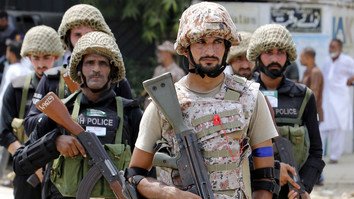QUETTA -- Pakistani security forces have prevented the Khorasan branch of the "Islamic State of Iraq and Syria" (ISIS-K) from shifting its operational wing from Afghanistan to Balochistan province, Pakistan, according to security sources.
Recent raids on ISIS hideouts in Mastung, Kabu, Spilinji Harnai, and other areas in Balochistan have dealt a major blow to the militant group in the region, a Rawalpindi-based intelligence official told Pakistan Forward on the condition of anonymity.
The raids have led to the deaths of nine wanted ISIS-K suspects and the arrests of seven suspected leaders, he said.
Those arrested revealed that ISIS-K was seeking to relocate to Balochistan and establish a base "due to the changing security scenario in Nangarhar, Kunar, Paktika and some other restive areas in Afghanistan", he added.
Documents recovered during recent operations also revealed the organisational structure of ISIS-K in the region, the source said.
"Pakistan is determined to eliminate the menace of terrorism and will never allow any group to destabilise the region," he added.
"Pakistan has consistently been requesting that Afghanistan ensure effective border management, but no result-oriented strategy has been adopted," the source noted.
ISIS-K has long been trying to establish a foothold in Pakistan, Sayed Asad Raza, a senior counter-terrorism official who previously served in Balochistan, told Pakistan Forward.
Local facilitators who were once part of other banned militant groups, including Tehreek-e-Taliban Pakistan (TTP) and Lashkar-e-Jhangvi (LeJ), have been killed in past operations in the country, Raza said.
"ISIS has been trying to fuel ... extremism in Pakistan, and the main objective of this group is to create an atmosphere of instability through sectarian riots," he said.
The recent counter-insurgency effort foiled attacks planned on Shia pilgrims returning from Iran via the Quetta-Taftan route, according to Raza.
"ISIS-K is making every possible effort to establish its influence in the tribal belt of Balochistan," he said.
"The security of the Pak-Afghan border areas has increased tremendously. It is our top priority to prevent the entry of extremists from Afghanistan into Pakistan."
The ongoing insurgency in Balochistan is part of a new wave of terrorism aimed at halting foreign investment, he added.
Ensuring stability
"Balochistan and some tribal areas of Pakistan have been suffering from insurgency for the last two decades. In the ongoing changing scenario in the region, it is the need of the hour to reassess the security situation of the troubled areas," said Maj. (ret.) Muhammad Omar, a senior Islamabad-based security analyst.
"This whole situation needs to be seen in the context of how far ISIS can keep itself active in the region," he said.
The government should also take the border tribes into confidence to prevent ISIS and TTP militants from gaining a foothold in the country, Capt. (ret.) Abdul Khaliq Achakzai, central vice president of the Balochistan Awami Party, told Pakistan Forward.
"The security situation in Pakistan is directly linked to the country's political stability. Extremism and ongoing anarchy cannot be rooted out until political stability is ensured in the country," he said.
"The efforts to destabilise Pakistan can't succeed without internal facilitators. The government must pay attention to the conspiracies that are being hatched to revive anti-peace groups that were largely eliminated during operations carried out under the counter-terrorism National Action Plan (NAP)", he said, referring to a multi-year strategy that the government launched after the December 2014 Peshawar Army Public School massacre.
Anti-peace groups could take advantage of the gaps emerging these days between the state institutions and the public, he said.
"It is very imperative to take the local tribes into confidence for countering those militants who are using the cover of the local population," Achakzai said.

![A guard watches over the National Cricket Stadium in Karachi on September 19. [Rizwan Tabassum/AFP]](/cnmi_pf/images/2022/10/25/38139-000_32jp9ey-585_329.jpg)







The growing influence Daesh in Pakistan is not possible in any way without the facilitation, if the Pakistan wants to deal with this calamity, it should deal with the elements that are fuelling sectarian extremism and streamlining the way for Daesh in the country.
Reply2 Comment(s)
Great analysis. I think it is a fact that the activities of terrorists are increasing in Balochistan and there is a need to take concrete action against Daesh etc.
Reply2 Comment(s)